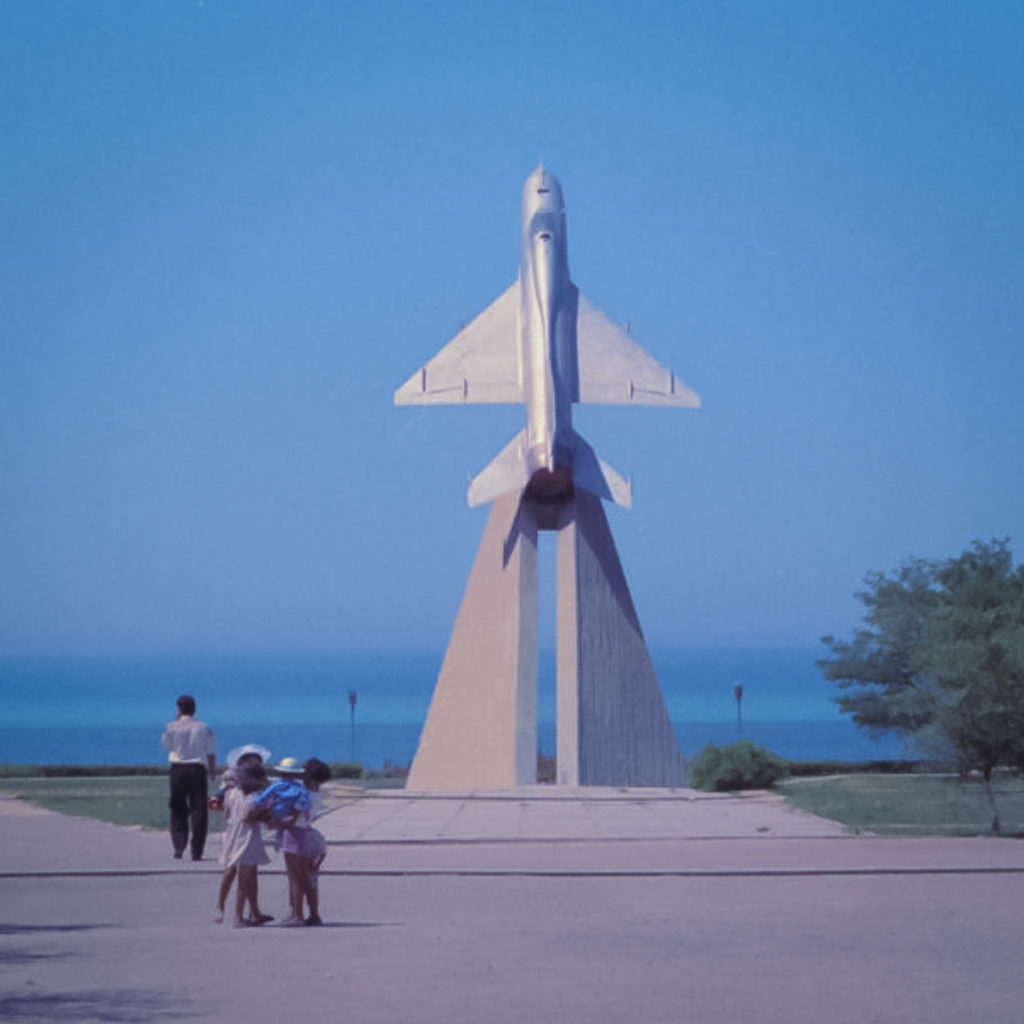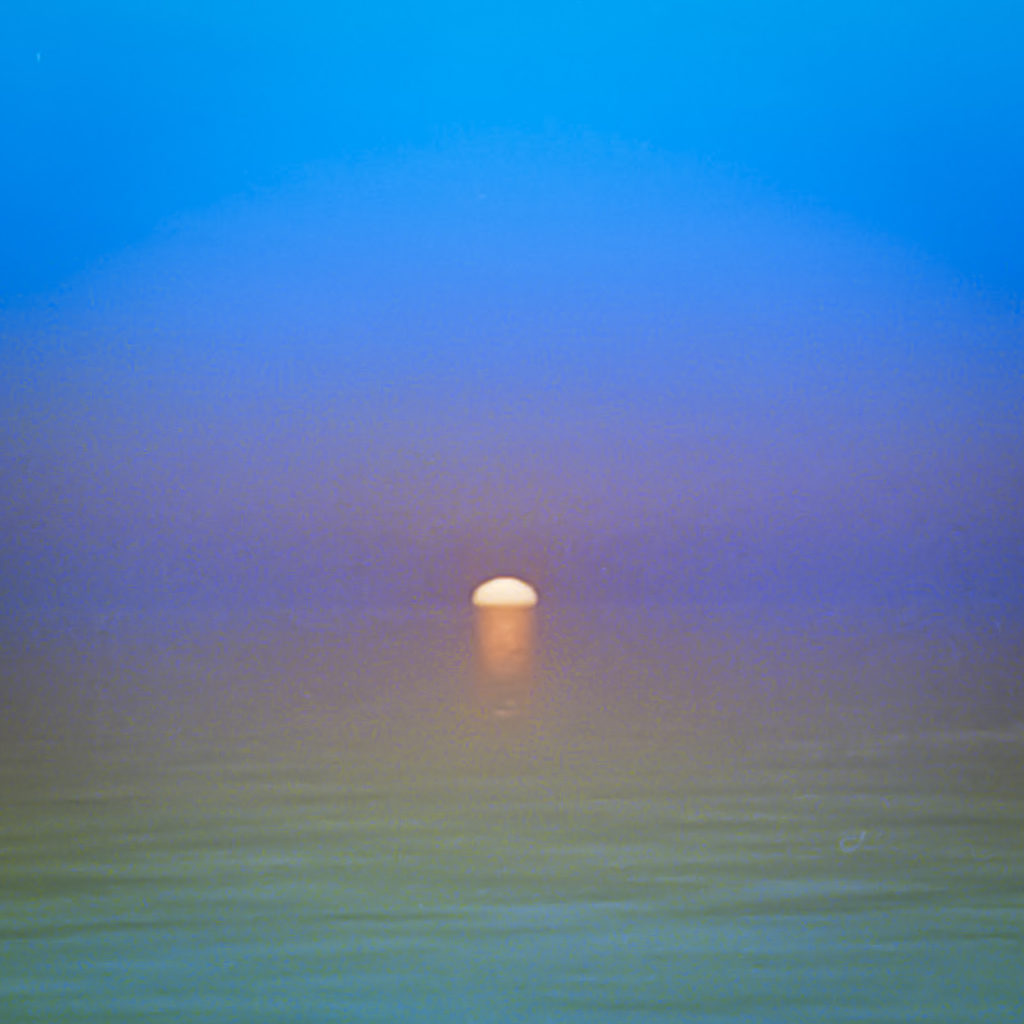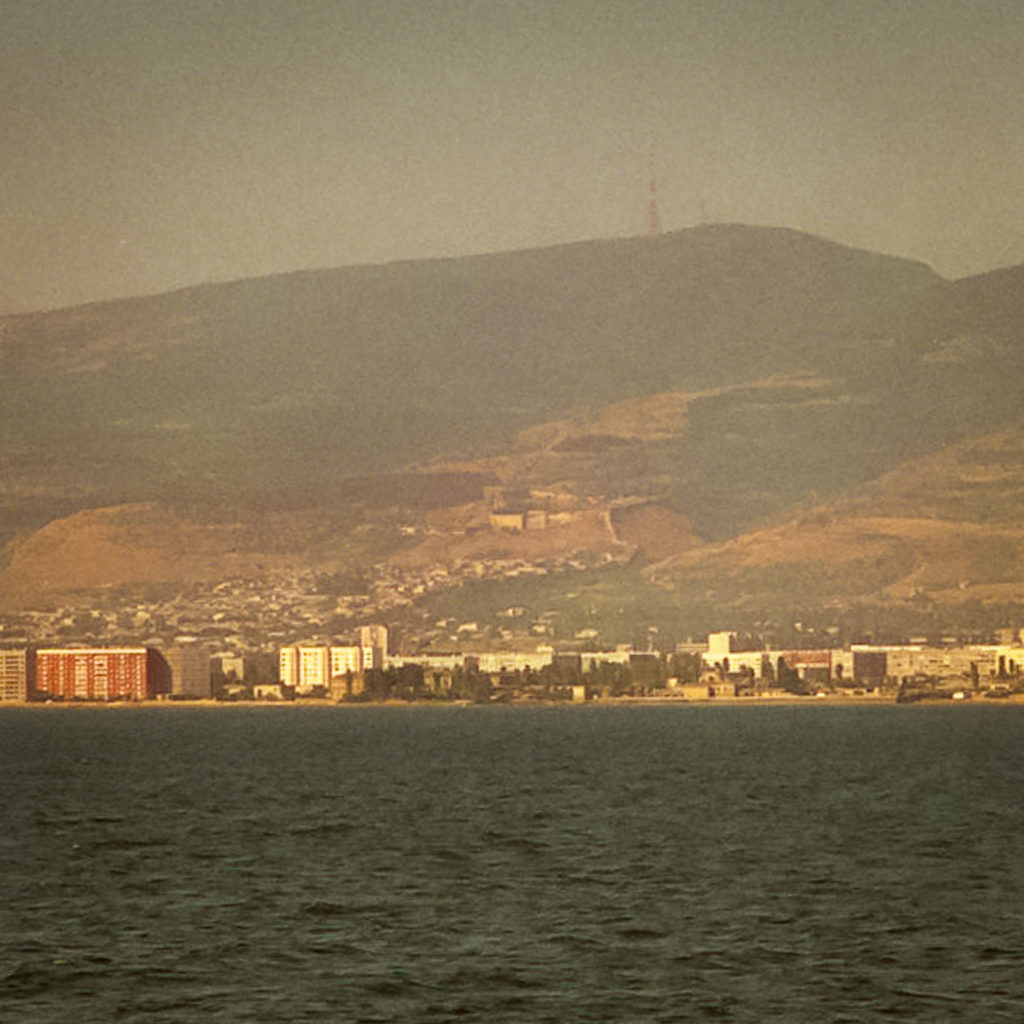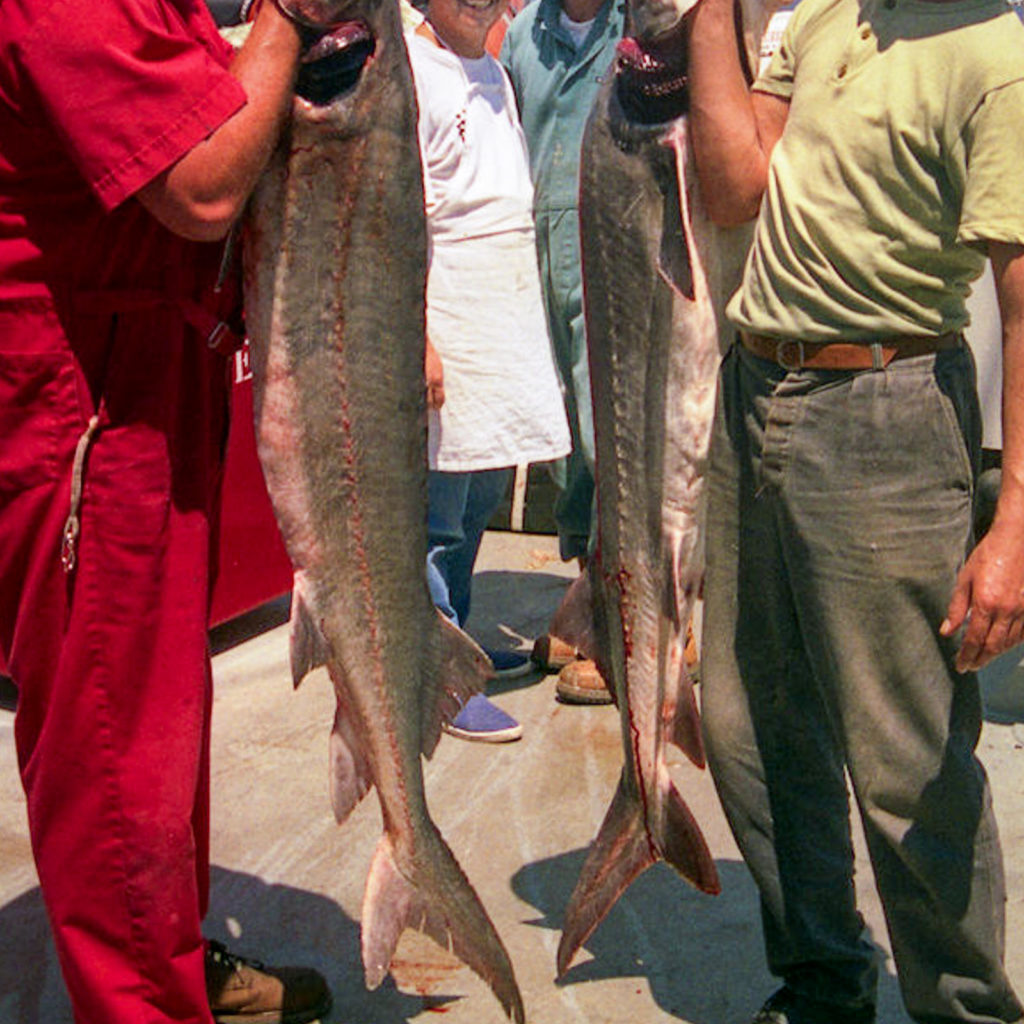We’ll be walking to the Somme this day next year or perhaps the year after, pandemic dependent. The day’s walk will be mostly through lands occupied by Germany in 1916, east of the main battlefields of the Somme. We’ll walk south from Bapaume, passing Combles and finishing in Péronne. I look forward to the opportunity to visit some of the sites not out of macabre interest but to remind me just how fragile peace can be. Assuming things haven’t kicked off again in post-pandemic melt-downs.
Still under curfew, I trawled disk drives yesterday and recovered a lot of ‘missing’ photos. Among them were some memories of a month in the Caspian. Ironically, my first memory was my return journey.
The return home from the month at sea was marred by a dispute over life insurance. I refused to fly on a military plane chartered for the first leg, a skip across the Caspian from Aktau to Baku. I declined when my insurer confirmed that death within military grade air-transport wasn’t covered. Through the joys of ship-board fax, I was handed it writing by the manager of the ship’s crew. He too was being flown home and asked me if I thought they’d be insured. My reply unsettled him because he’d never read the small print of a contract he’d long since signed. I wasn’t employed by their employer, I was on a short term contract with them and nowhere in my contract was such an issue covered. It did say they were responsible for my flights but that was about price of the seat not the cost of looking after my family in perpetuity. I learned that quite a few of the crew had reservations about their memories being honoured appropriately too.
Nonetheless, we all went together directly from the ship to the airport after a gorgeous sunset. The rest of the crew went to their military transport after we had a couple of bon-voyage beers. They got home half a day before me because I went the opposite direction, east, back to Almaty. I bumped into the company’s country manager when we found ourselves boarding the same Almaty bound plane. We stood under the anus of the plane, at steps leading up to the rear door beneath the two rear mounted engines. It was a swelteringly humid July night. Stinking toilet waste was dripping down all around us, the air rank with an admix smell of avgas and he said ‘You really set the cat amongst the pigeons today’. The culture of the day suggested this was a threat to future contracts with this global company. Black mark or not, urine on my shoulder for sure, I sardonically replied that I’d only done it ‘so that I could be with you when we go down’. He joked about having a guarantee of our arrival because it was only air-conditioner drip mixed with toilet waste rather than a fuel leak. We parted amicably after shrugging off a white knuckle landing in Almaty. Seriously, I was sure I could see the eyes of startled chickens looking up at us as we flew the last twenty minutes in a ground hugging approach. I was worrying if the wheels would still work after stripping ridge tiles from the roofs below. Had this pilot served in the Russian forces in Afghanistan? Was flying this low a way to avoid being shot down? Was this defensive thinking like some of the helicopter rides to rigs offshore UAE piloted by US Viet Nam vets who still landed tail first to present armour-plated belly to would be attackers?
It had been an interesting trip for so, so many reasons. Aktau wasn’t my first encounter with the paraffins of avgas. The first was on my way there from Almaty. I still remember a blonde, blue-eyed Russian smoking a cigarette at the wheel of the aeroplane as a wing tank above him was being refuelled. It was 40°C at 7:30 in the morning and he stood under a haze of iridescent vapour into which his smokey exhalations rose. I knew that the flash point of kerosene was much higher than petrol. How much higher was uncertain, so I backed away from the mid-ship dual-stairs at which we were queueing to board the weirdly double-doored plane. At the top, a stewardess of 150 surly welcomes saw me walking backwards, followed my gaze and started to call the special forces giant. Diplomatically, I think; his demeanour was at once careless and ruthless. She wasn’t much nicer.
I’d arrived in Almaty the day before and was a bit sleep deprived.Each floor of the hotel had it’s own reception desk, my floor staffed by a grumpy middle-aged woman. She made me sign in and escorted me to my room which she inspected as I put down my bags. She spoke no English, at least not while the sun was up. Around about 3 am, she called to ask in English if everything was satisfactory. I presumed this was a security hang-up from the days before independence rather than an independent entrepreneurial reminder of undocumented room services. She called again at 430 to make sure my air-conditioner was still working. And I had to get up and leave at 5 so that was the end of my night. I said goodbye to her as I waited for the lift and she gesticulated very sourly that she didn’t speak English. The sun had risen again. And I ended up seeing a sunset in Aktau.
We drank vodka from small distilleries around Moscow while we waited for two days for our ship to arrive in port. A couple of Muscovites were billeted with me in an apartment with steel reinforced doors in a tower block among nameless tower blocks on the streets of Aktau that have no names. I can’t recall which district we were in. Unlike the arrondissements in Paris, these did not hide commemeratively named, even elegant streets that might give you something to think about during a commute. Designed once, built many, many times: lookalike housing for replaceable workers. We were but a number in 4 11 F 8 14 or perhaps 14 4 G 7 6 or wherever the soulless conventions of Fort Shevchenko addressed us. ‘Use the plane as a landmark’ said a colleague.
Each of the Russians had a small suitcase from which they unpacked equal volumes of clothes and vodka in the living room. And they had bought or brought huge quantities of caviar from Volgograd. A kilo of finest caviar. And a few bags of slightly stale sliced bread. You couldn’t close the windows that week because there was a heat wave and it was at least 60 degrees C when the sun shone in. And still above body temperature even at night. You could convince yourself that the stench of fish drying on the balconies of adjacent flats was pleasant if you had enough vodka. The other stench was of urine. The nameless building we lived in only got water between two and four in the morning. All around these tower blocks, peoples’ lives were organised around the water table, a schedule that managed water supply, one building at a time. Somebody had to get up to flush when there was water. All three of us tried to match the time of other visits to the bathroom to the presence of water. Tooth washing, showering and more in the middle of the night was unusual but not as impractical as you’d imagine. The stench was the bigger problem. The vodka helped.

Landmark 
Dragonflies imagine. 
Derbent 
Sturgeon
‘What does a fish know about the water in which he swims all his life?’
– Albert Einstein in The World as I see it, 1935.
A couple of days out from Aktau, a storm hit us. We’d been enjoying the most magnificent sight of huge dragonflies appearing from mirrored seas at dawn. Suddenly, it had all changed. A freak wave pushed in a porthole light in the galley during breakfast. Perhaps it was because the ship was 25 years old and needed some TLC. The first reaction at the table closest seemed to be annoyance that the jet of water had thrust a microwave oven to the floor. Fair enough, it was reheating coffee at the time. The rest of us were momentarily concerned that this porthole was almost at waterline. No more water ingress, no worries, and a metal sheet was welded in place by the time I was back for lunch.
This trip was the first time I’d ever eaten sturgeon for breakfast. We’d sailed north from Aktau towards Astrakhan and the mouth of the Volga, and turned south to see the mountains of Dagestan. Which is where we changed diet. We only had the sturgeon because several got snagged by the 5 km cable we towed. It was embedded with seismic listening devices called hydrophones. It was in-tow some seven metres below the surface, strung out straight behind the ship while doing our seismic surveying. Lots of steaks were taken from one of the fresh fish and served for the next dinner. The others were specifically butchered to be hung at the front of the ship to be air-dried over the coming few days. And we had fresh surgeon steaks for breakfast and lunch too. And there was dried sturgeon soup before dinner for a week.
That first of the sturgeon dinners was delayed by the arrival of a power boat and several men brandishing machine guns. They explained that they owned the fish and that our illegal cable had severed their illegal fishing nets and they wanted reparations. It was July and a shimmering view of the wonderful castellated town of Derbent was the backdrop to this discussion. The magic of the view contrasted with the insecurity of the situation. Their nets were returned and I think market rates for fresh sturgeon must have been discussed because our ship’s captain bought the sturgeon and they went away.
A couple of the engineers on the boat were from the area of Chernobyl. Both smoked horrible cigarettes, a legacy from unwanted German visitors during the Second World War. Cardboard shrouded, vile smelling, they could and did chain smoke them out on deck, beside the vile smelling, drying sturgeon at one point. Both men had stories to tell from Chernobyl. One laughed about going home because he was missing hunting with his cousins for oversized, mutant rabbits. The other was quieter. He said he’d seen the meltdown. He was a dry, breathless cougher, clearly sick, and we presumed his future hunting opportunities would be limited.
I don’t want to say too much while remembering that we were in Russia because on one occasion, perhaps we weren’t. Our employer was Russian. I pointed out some things in the data that surprised me, telling the representative from Moscow that they might be of interest. Initially he dismissed my observations. He said the anomalies were in such deep water as to be beyond engineering technology and couldn’t be tested let alone exploited. Furthermore he said it was so big and covered such an area that it had to be something else. I had a few American geophysical periodicals with me so I showed him a report from recent oilfield discoveries in Brazil. They were in water as deep if not deeper than where we found ourselves. It wasn’t my job but I used the data we had to sketch out the extent of the anomaly that I’d seen. A crude sketch but it was a map with which he could make an extra daily report to Moscow. Suddenly he was animated because they were animated because he had found a promising lead. Meantime, our surveying was being interfered with by another vessel. Our compressed air sources were popping a contamination of lateral noise into one another’s data. Work was interrupted the next day when the other vessel was to the north of us and radioed to ask who we were. They said they were in Azerbaijan and that if were south of them, we must be in Azerbaijan too. We told them that if they were north of us, they had just admitted to operating illegally in Russia. Such things happen around disputed maritime borders and at the time, none of these countries could afford to run their gun boats to prosecute their disputes. Our tour ended and we returned to Kazakhstan shortly after that. I’ve since read about some of the technical challenges in producing hydrocarbons from vast fields subsequently discovered in the region. Perhaps not from the anomalies we saw in 1996.
From Holidays in Hell to Holidays in Heck, I have a debt of gratitude to PJ O’Rourke. The Republican Party Reptile introduced me to the concept of paying attention while travelling. I had long realised that travelling wasn’t just a passive pleasure of endless drinks by the beach. Business travel tended to be focussed on business alone so you had to learn to observe. You’d be rewarded by catching sight of seals being snatched by sharks, seeing sparrows flying into your room to steal your macaroons and dealing with frogs that might inhabit your toilet bowl. O’Rourke spoke at the Dalkey Book Festival in 2015. Afterwards, I mistakenly asked him to sign a copy of Holidays in Heck. I wonder if I thought it was a politically corrected market name for the Hell I had enjoyed so much more. No, stupidity is stupidity. It turned out that O’Rourke liked a bit of butchery in his spare time. This I know because we have a friend who is a local taxi driver who worked with the Dalkey Book Festival and had O’Rourke on his schedule that year. He used to be a butcher so they got on famously, swapping barbecue marinade and blade tips.
By thy way, that’s not the only book that I’ve had wrongly signed by a famous author. Lia was pretty upset with me when I queued for thirty minutes to have ten seconds with Jostein Gaarder to whom I handed The Orange Girl rather than Sophie’s World. I’d bought the one that supported his publisher rather than a second copy of a book that had educated us.

Leave a Reply